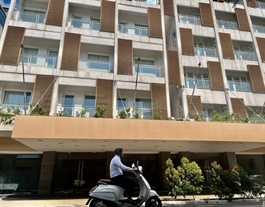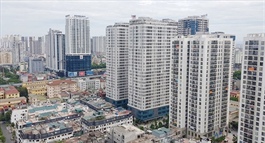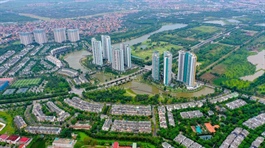Foreign investors optimistic on added property attraction
Foreign investors optimistic on added property attraction
Vietnam’s property market is still attractive to the foreign community, but it is necessary to continue to improve its legal landscape, information transparency, and data availability to create further enhancements for foreigners to invest.

The Vietnam Real Estate Association and Vietnam Real Estate Research Institute published its annual report on Hanoi’s mid- and high-end property market for the next three years in early June, which gives the perspective of domestic and foreign experts on the current market.
After surveying 300 large investors and organisations, the report said 10.5 per cent of respondents saw the real estate market and prices in Vietnam as ‘highly attractive’; 47.4 per cent rated them ‘very attractive’ but said the country needed to improve conditions; 21.1 per cent rated it ‘rather attractive’, 15.8 per cent ‘slightly attractive; and the remaining 5.3 per cent cited it as ‘not attractive.’
Eric Park, chairman of the Korea Real Estate Services Development Association, said that Vietnam’s real estate market was one of the top investment priorities of South Koreans. “The reason is that the interest rates are very low in recent years, so they are keen to invest in real estate. I think as long as there is economic growth, real estate prices will continue to increase,” Park said.
Not only at home, South Korean investors are also a big factor in the global real estate market, with investment decisions ranging from $50 to $400 million, according to Park.
In the Vietnamese market, many Korean developers have already invested in Vietnam and many individuals own apartments in the big cities.
However, while some are eager to invest, many are concerned about the laws for foreign investors. However, with an improved legal system, Park said Vietnam would remain Korea’s top-priority investment market.
“Currently, the flow of South Koreans living and working in Vietnam is increasing every year. The demand for housing, workspace and entertainment for this group is also increasing,” he said.
“For example, offices for lease and the hybrid working model are the main trends in the rental market. Tenants from the tech and biotech industries are growing. Office streets where many corporations and companies are concentrated, will draw tenants to move in to find the best rental price.”
Many domestic experts assess that Vietnam is facing many problems, similar to the period of economic crisis in the 2008-2013 period. However, Datuk Joseph Lau, CEO of Parkcity Group, a real estate developer from Malaysia, is optimistic that the real estate market in Vietnam will soon improve.
“The market in Vietnam has not always been smooth sailing, especially during the global financial crisis and the pandemic. We are optimistic that soon the overall local real estate market will perform better with an anticipated GDP growth and that our products will continue to draw positive buyers and investors,” he said.
In Vietnam, the control of credit and bonds has made it difficult for both businesses and people to access financing loans for real estate. The rising lending rate has weakened demand. Financial funding is one of the main struggles and difficulties faced by our consumers.
“To overcome this, we have introduced flexible payment schemes and collaborated with banks in offering a better lending rate,” Lau added.
According to Lau, sustainability will be one of the key drivers defining Parkcity’s business. In order to create sustainable communities, they need to be diverse, well connected, and conveniences need to be thoughtfully designed. Parkcity will place more sustainable elements and features across all its developments in the near future.
He also emphasised the importance of diversifying products to meet the needs of customers of different ages, with different needs and desires.
“There are many opportunities, along with challenges. It is necessary to keep a positive attitude and explore new ways of the digital age and explore potential markets,” he added.
As of May 20, the total registered foreign investment capital into Vietnam in the first five months reached nearly $10.86 billion, down 7.3 per cent over the same period of last year.
Among those, the processing and manufacturing industry took the lead with a total investment of more than $6.64 billion, accounting for 61 per cent of the total registered investment capital and down 2.5 per cent over the same period.
Banking and financial activities ranked second with a total investment of more than $1.53 billion, accounting for more than 14.1 per cent of total registered capital and increasing more than 12 times over the same period.
Real estate business and science and technology ranked third and fourth respectively with the total registered capital of nearly $1.16 billion (down 61.3 per cent) and nearly $481 million (up 28.3 per cent).























